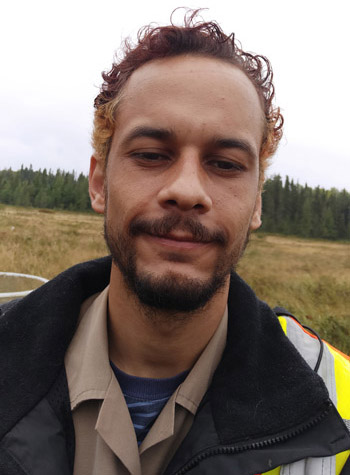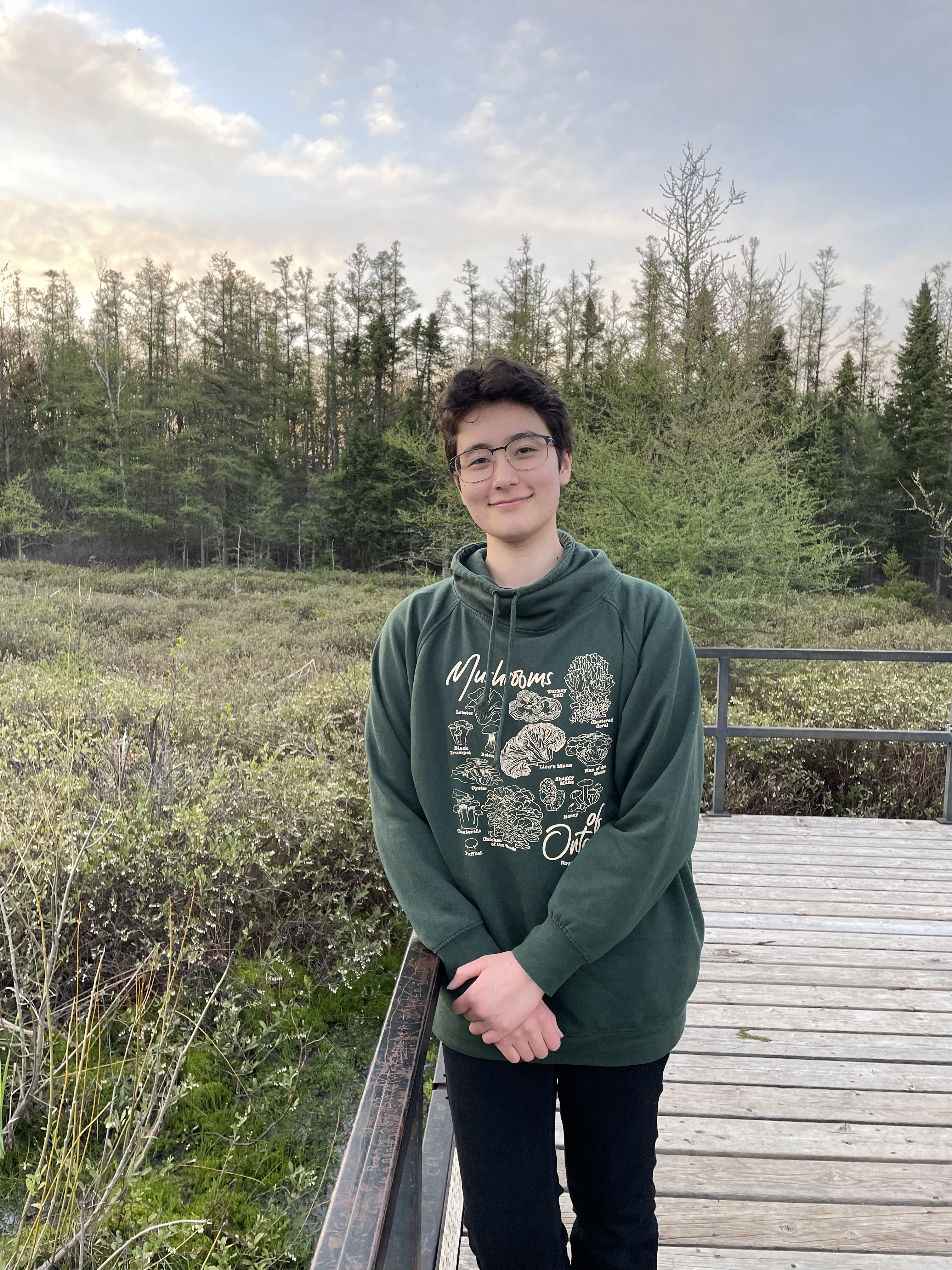I developed an interest in soil ecology while completing my undergraduate thesis with Dr. Lindo (2021-2022). I am interested in aboveground-belowground interactions and the relationship between biodiversity and ecosystem functioning. For my M.Sc. I will explore how cover crop biodiversity affects agro-ecosystem services and functions to promote soil health and agricultural sustainability. Dr. Zoë Lindo is an expert in soil biodiversity and ecosystem function. They have worked extensively in Canadian forests including the mixed-wood boreal of Alberta, the subarctic taiga of Quebec, the coastal temperate rainforest of British Columbia, and the black spruce / peatlands of Ontario. In their spare time, Dr. Lindo discovers and describes new species of soil arthropods. The overall focus of my research aims to mitigate biodiversity loss in association with anthropogenic environmental change and maintain ecosystem functioning in Canadian forest and soil ecosystems. I describe myself as a biodiversity scientist to encompass the breadth of my research in the areas of community ecology, soil ecology, and taxonomy. I received my B.Sc. in Biology from Western in 2017 and my M.Sc. in Environmental and Life Sciences from Trent University in 2020. For my master’s thesis, I studied the effects of wood ash application on temperate forest soils, soil water leachate, and vegetation. From 2020-2021, I worked as a Forest Research Intern and Project Biologist for the Ministry of Northern Development, Mines, Natural Resources and Forestry in the Forest Research and Monitoring Section, where I contributed to several projects in both the boreal and mixedwood forestry programs. I began my PhD in the fall of 2021, where I seek to understand the drivers of SOM decomposition, formation, and stabilization in managed boreal forests, specifically looking at both abiotic and biotic processes that regulate microbial carbon use efficiency (CUE). I hope this research will improve microbial-biogeochemical models by providing accurate estimates of CUE to predict how soil texture and silviculture impact microbial activities such as soil organic matter (SOM) decomposition and, ultimately, the stabilization of carbon in the boreal forest. Mites are amazing; I find this out five years ago when a beetle full of phoretic mesostigs mites landed on my breakfast table. Since then I have worked extensively with the diversity of soil mites in caves in the state of Minas Gerias- Brazil. In the acarology laboratory of the Federal University of Minas Gerais (UFMG), I worked directly in the curatorship of the taxonomic collection, identification and description of new species of mites, and in the production of support materials such as identification keys. Mites never fail to pique my curiosity and desire to learn more about life on earth! This fall (Sept/2022) I joined the Lindo Lab team for my Master's degree under the guidance of Dr. Zoë Lindo where I seek in the ecological approach to expand the knowledge about predator/prey relationships and distribution patterns of acarofauna in Canadian peatlands. João Martin - M.Sc. student (since May 2024) I like to say that I didn't choose to study mites, the mites chose me. I started my journey into their universe in 2014. Since then, I've been working with a wide range of mites, but focusing more on the agricultural sector, working directly in taxonomy, doing laboratory tests (like predation and biology) and describing new species. I'm also passionate about working in the field, so I had the opportunity to be part of a committee that tried to solve the spotted fever mountain (caused by ticks). Over the course of my career, I have assisted numerous M.Sc. and Ph.D. students, as well as foreign researchers. I have published seven papers and was working on several others before my departure. In my senior project, I described a new species (Ascidae: Antennoseius) with a worldwide identification key for subgenus of 40 species. I joined Lindo Lab this summer (May/2024). And I'll be pursuing a M.Sc. thesis, being under her guidance will be such a great opportunity. Jay Ing – B.Sc. Undergraduate Research Summer Intern (USRI) / Honour's student (2025-2026) Dr. Robert Buchkowski - 2019-2021 Katy Faulkner - 2021 Visiting Mitacs Ph.D. student Dr. Mari Könönen - 2019-2020 Dr. Laurent Rousseau - 2018-2019 Dr. Asma Asemaninejad - 2017-2018 Matthew Meehan - Ph.D. (2018-2022) Thesis: From individuals to communities: the effect of climate change on ectothermic predators Carlos Barreto - Ph.D. (2016-2021) Thesis: Diversity and drivers of oribatid mites (Acari: Oribatida) in boreal peatlands Asma Asemaninejad - Ph.D. (2013-2016 co-supervised with R.G. Thorn) Thesis: The impacts of climate change on communities of fungi in boreal peatlands Catherine Dieleman– Ph.D. (2012-2016 co-supervised with B. Branfireun) Thesis: Ecosystem level effects of climate change on northern peatlands Emelie Obi - M.Sc. (2022-2024) Thesis: Effects of experimental warming and reduced moisture on oribatid mite communities in boreal peatlands Samantha Hopkins - M.Sc. (2022-2024) Thesis: Experimental warming and its effects on Sphagnum traits and community composition in boreal peatlands Cristina Turcu - M.Sc. (2022-2024) Thesis: Microbial community response to experimental warming in boreal peatlands Trevor Pettit - M.Sc. (2021-2023) Thesis: Changes in peatland soil fauna biomass alter food web structure and function under warming and hydrological changes Madelaine Anderson - M.Sc. (2018-2020) Thesis: Foliage type controls mercury input, storage and release in the Boreal forest Grace Carscallen - M.Sc. (2018-2019) Thesis: Arthropod diversity in contrasting Ontario peatlands Caitlyn Lyons - M.Sc. (2017-2019) Thesis: Above- and belowground community linkages in boreal peatlands and climate warming implications Jordan Kustec - M.Sc. (2017-2018) Thesis: Top-down and bottom-up effects on Collembola communities in soil food webs Julia Palozzi - M.Sc. (2015-2017) Thesis: Peatland plant-soil feedbacks dictate ecosystem properties and processes Rachel Chambers - M.Sc. (2015-2017) Thesis: The influence of adjacent forest and agriculture on restored grassland diversity and composition Rosa Del Giudice - M.Sc. (2014-2016) Thesis: Decomposition dynamics under climate change conditions in boreal peat Paul George - M.Sc. (2013-2014) Thesis: A comparison of community compositional analyses for the assessment of responses to wood-ash soil amendment by free-living nematodes Matthew Turnbull - M.Sc. (2012-2014) Thesis: The effects of global climate change on Canadian Boreal forest Collembola communities Danielle Griffith - M.Sc. (2012-2014) Thesis: Exploring climate change factors on nitrogen fixation and growth in the cyanobacterium Nostoc punctiforme Rachel Darvill - M.Sc. (2012-2014) Thesis: Comparing and mapping ecosystem service use across interest groups in the Peace River Valley Emily Laver-Shareski – Honour's B.Sc. student (2024-2025) Thesis: Initial temperature matters: The contrasting effects of climate warming on microarthropod predator-prey interactions in two Ontario systems Paige Ferguson – Honour's B.Sc. student (2023-2024) Thesis: Disentangling the effect of temperature and moisture on boreal peatland microbial activity and function Eileen Reinke – Honour's B.Sc. student (2021-2022) Thesis: The interactive effects of acute temperature change and prey body size on ectotherm predator feeding behaviour and rate Trevor Pettit – Honour's B.Sc. student (2020-2021) Thesis: Modeling soil carbon cycling in boreal peatlands under future climate warming Shae-Lynn Dehens – Honour's B.Sc. student (2020-2021) Thesis: Comparing vegetation survey methods for peatland communities under warming Divya Ramachandra – B.Sc Honour's (2019-2020) Thesis: Predation rate in Stratiolaelaps scimitus (Womersley) (Acari: Mesostigmata) in response to short-term acclimation Aejah Blesch – B.Sc Honour's (2020) Thesis: Assessing boreal peatland invertebrates (Diptera and Araneae) for mercury contamination Emily Purvis – B.Sc. Honor's (2018-2019) Thesis: Agricultural field margins as bumblebee (Bombus spp., Hymenoptera; Apidea) habitat in Southwestern Ontario Devdutt Kamath – B.Sc. Honor's (2017-2018) Thesis: Nematode functional diversity in contrasting boreal peatland sites Nicole Pepe – B.Sc. Honor's (2016-2017) Thesis: The effects of poly(ethyl)glyoxylate on microbial activity Shauna Taylor – B.Sc. Honor's (2014-2015) Thesis: The interactive role of edge effects and habitat quality in maintaining biodiversity Matthew Meehan – B.Sc. Honor's (2014-2015) Thesis: The effect of patch configuration disturbance for the recolonisation of mesofauna Margaret Sawatzky – B.Sc. Honor's (2013-2014) Thesis: Looking past the trees: The ecological significance of moss-associated cyanobacteria in response to climate change Jamie Fraser – B.Sc. Honor's (2012-2013) Thesis: Does functional diversity matter? Evaluating community responses of Collembola after Cd contamination and phytoremediation Eileen Reinke – M.Sc. student (since 2022)
Eileen Reinke – M.Sc. student (since 2022)Dr. Zoë Lindo - Professor

Students, Postdocs, and Research Assistants
Holly Deighton – Ph.D. student (since 2021)
 Pedro Henrique Conceição – M.Sc. student (since 2022) - transfer to Ph.D (Jan. 2024)
Pedro Henrique Conceição – M.Sc. student (since 2022) - transfer to Ph.D (Jan. 2024)

Lab Alumni
Postdoctoral Fellows, Postdoctoral Assistants and Visiting Students
Ph.D.
M.Sc.
B.Sc. Honour's
You are using a browser that is not standards-compliant. The information on this Web site will be accessible to you, but for a list of Web browsers that comply with the World Wide Web Consortium standards, please visit our Web standards page.
Lindo Lab
